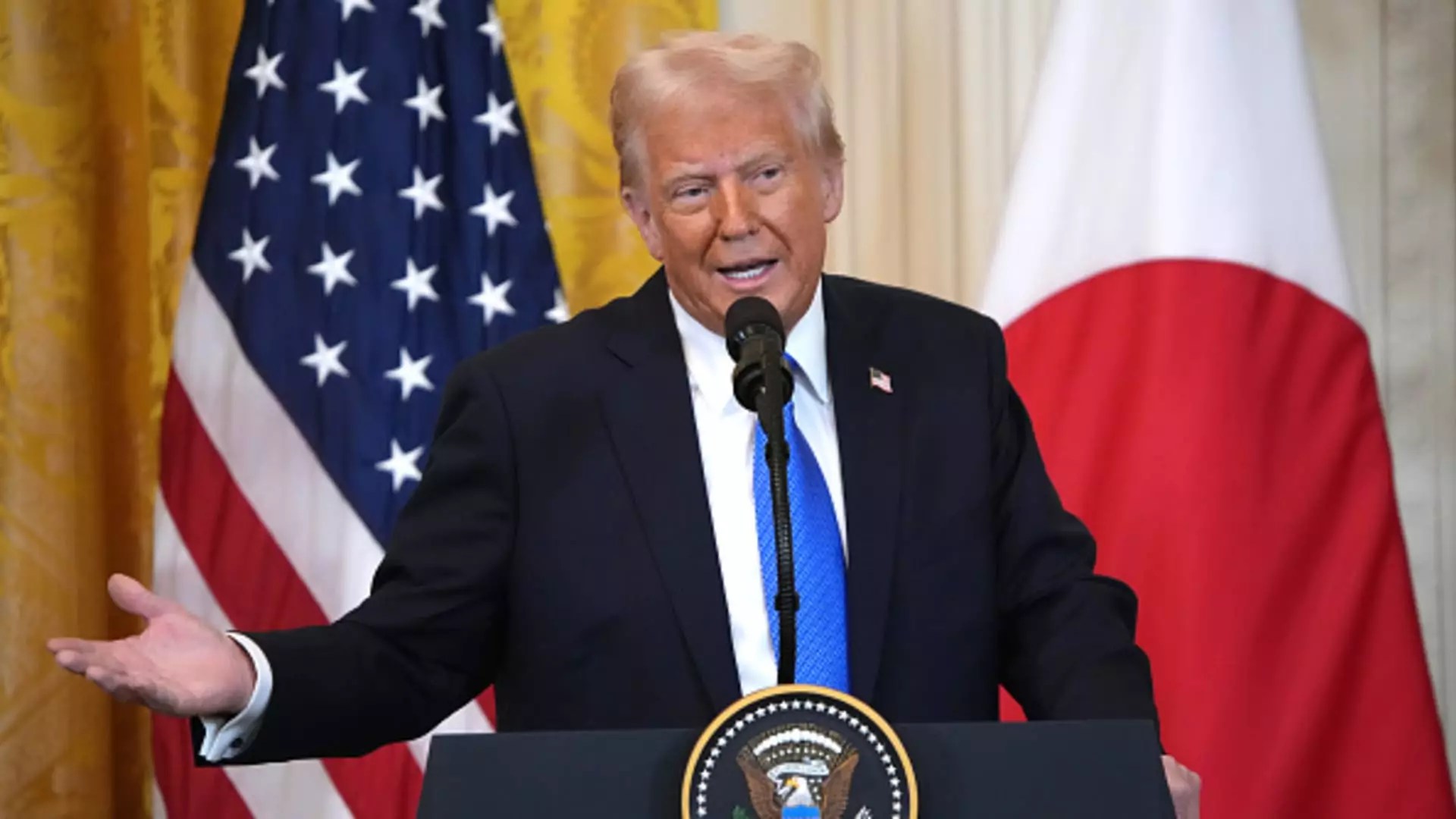The recent announcement of a sweeping trade agreement between the United States and Japan, heralded by former President Donald Trump, exemplifies the slick language often used by political figures to mask underlying economic realities. Trump’s claims of a “massive” deal, with promises of $550 billion in Japanese investments and purported creation of hundreds of thousands of jobs, are exaggerated and misleading. While the rhetoric might evoke a sense of national pride or economic renaissance, a critical analysis reveals that the tangible benefits for workers and consumers may be far less substantial than the narrative suggests.
The focus on reciprocal tariffs of 15% on Japanese exports to the U.S. appears, at first glance, to be a concession. Yet, behind this seemingly minor adjustment lies a complex web of economic consequences. Lowering auto tariffs from 25% to 15% does give some relief to Japanese automakers, but it also consolidates a broader trend of trade liberalization that could erode protections for American industries. This kind of “compromise” often facilitates a steady influx of cheaper foreign goods, which can depress domestic manufacturing, rather than bolster it. The rosy picture painted by Trump’s social media claims ignores the long-term risks of fostering a global trade environment that favors multinationals over local workers.
The Myth of Economic Dollar Signs and Job Booms
The promise that the deal will generate “hundreds of thousands of jobs” is not just an optimistic projection but a dangerous oversimplification. Trade deals cannot be reduced to mere numbers on a spreadsheet, and economic benefits are rarely evenly distributed. While the Japanese auto industry might see immediate gains, American workers face the possibility of job displacement in sectors exposed to increased competition, especially in manufacturing and agriculture. The claim that the U.S. will “receive 90% of the profits” further stretches credulity, as profits are often redistributed or concentrated among corporate elites, with minimal trickle-down effects for the average worker.
Notably, the data shows Japanese auto exports to the U.S. have already declined significantly—by over 26% in June alone—highlighting that the industry is under pressure regardless of tariffs. The mere reduction of tariffs does little to address the structural shifts that threaten American manufacturing sectors. It’s important to recognize that these agreements often serve political interests more than economic ones, cloaking compromises made behind closed doors as victories for the American people.
Political Calculations and the Erosion of Trust
This trade deal cannot be disentangled from the political context of its announcement. Japan’s internal politics, strained by recent electoral setbacks for its governing coalition, have made stability contingent on favorable economic deals. For Prime Minister Ishiba, a figure under threat of losing authority, the apparent success of the U.S.-Japan deal could serve as a political lifeline, knitting together fragile coalition support. But such moves threaten to prioritize expediency and short-term survival over substantive policy substance, undermining trust in diplomatic institutions.
Moreover, Trump’s framing of the deal, including references to “perhaps the largest deal ever made,” resembles classic populist rhetoric—bold, attention-grabbing, yet ultimately hollow. As the market reacts with enthusiasm—auto stocks soar and the Nikkei rises—there is a failure to critically assess whether these gains will translate into tangible benefits for the broader population. Historically, such euphoric market responses have often been short-lived, followed by increased volatility and economic disillusionment.
The Illusory Promise of Trade Liberalization
While proponents paint this deal as a victory for free trade, it in reality perpetuates a fragile, unequal system that favors corporate interests over workers’ welfare. The concessions made are seldom balanced, and the promise of job creation often underdelivers or comes with hidden costs. The shift toward more open markets does not inherently lead to a fairer or more prosperous economy—rather, it often accelerates inequality and erodes the social safety net.
Trade policies rooted in nationalism or populist rhetoric tend to overlook the necessity of safeguarding domestic industries and ensuring that gains from globalization are equitably shared. Instead of celebrating superficial victories and inflated numbers, policymakers and citizens should demand more sustainable, inclusive economic strategies that prioritize workers’ rights, environmental protections, and social well-being over fleeting political optics.
The purported agreement with Japan underscores a troubling trend: the allure of quick wins and bold claims often distracts from the deeper task of building a resilient and fair economy. It’s high time for political leadership to shift focus from sensational deals to policies that genuinely serve the interests of the many, not just the powerful few.

